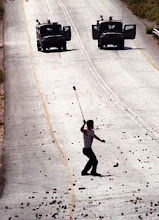It was announced yesterday, August 2nd, that outgoing Colombian president Álvaro Uribe Vélez will be the Vice Chairman of the U.N.’s four-member international committee tasked with investigating the Israeli commando attack on the Gaza Freedom Flotilla. On May 31st, Israeli forces attacked the MV Mavi Marmara, a Turkish ship manned by international activists delivering aid supplies to the besieged Gaza Strip. The ensuing confrontation left nine activists dead and dozens wounded and sparked international criticism of Israel.
Prior international investigations and condemnation have done little to change Israel’s colonial policies in occupied Palestinian territories. Appointing Uribe to this latest investigation preemptively undermines its credibility.
It’s difficult to catalogue and summarize the various political scandals that have plagued Uribe’s 8-year presidency. Three days before the announcement of Uribe’s appointment to the U.N. committee, the Colombian press reported the outgoing president’s verbal attack against Colombian Supreme Court Magistrate Yesid Ramirez, after Ramirez asked the nation’s prosecutor general to open an investigation into allegations that the president’s son, Tomás Uribe, bribed congressmen to ensure his father's re-election in 2006. The recent scandal is only the latest in one of many of Uribe’s public displays of contempt for the Colombian judiciary, the most famous of which was his outrage at the Court’s nixing of a referendum that would have allowed Uribe to run for a third presidential term.
More significant than political tumult or charges of corruption is Uribe’s contempt for international law, demonstrated by his government’s illegal use of the International Red Cross emblem in a hostage rescue mission in July 2008. Uribe admitted using the Red Cross emblem in the mission - which successfully duped the guerrilla into releasing several high profile hostages, including three Americans and one former Colombian presidential candidate – but dismissed the violation as a “mistake” committed by a soldier in a “state of angst”. Immediately following the mission, the Red Cross released a statement urging all sides to respect the ICRC emblem, but did not pursue the issue further. The Geneva Conventions prohibit improper use of the Red Cross logo.
As Uribe’s new appointment entrusts him with investigating the deaths of civilian activists, the most alarming aspect of his 8-year tenure is his government’s well-documented history of killing civilians and then presenting them as fallen guerrilla fighters or “terrorist sympathizers”. Starting in 2008, it was widely reported that the Colombian military had an established practice of luring poor young men from their homes with promises of employment, and subsequently killing them and presenting them as combat casualties. The practice not only served to stack battle statistics, but also financially benefited the soldiers involved, as Uribe’s government had, since 2005, awarded monetary and vacation bonuses for each insurgent killed. Human rights groups cite 3,000 or more of these so-called “false positives”. In response to the scandal, Uribe dismissed some of the military’s high command. But even when his critics are proven right, as was the case with the “false positives” scandal, Uribe steadfastly maintains a rhetoric that equates human rights defenders with armed terrorists. His attitude was most famously exemplified in a speech made in 2003:
“In Colombia, every time a security policy to defeat terrorism appears, when terrorists begin to feel weak, they immediately send out spokespeople to talk about human rights.”
Israeli claims that participants in the humanitarian aid flotilla, including those who lost their lives, were likely linked to “terrorist” organizations seem to echo Uribe’s vitriol. After the May 31st Israeli massacre in international waters, Fox News reported Israeli ambassador to Denmark, Arthur Avnon, as saying:
“Before the flotilla entered Israeli waters, rumor had it that the organizers [of the aid initiative] had links with the al Qaeda terrorist network… The people on board were not so innocent ... and I cannot imagine that another country would react any differently.”
One might surmise that Israel bowed to international pressure to participate in the U.N. probe because it sees a kindred spirit in Uribe, hardly an impartial arbiter of international humanitarian law and human rights. While the eventual outcome of the probe is still uncertain, Álvaro Uribe’s participation as Vice Chairman calls into question the sincerity of the U.N.’s investigation.
____
Carmen Andrea Rivera is an independent journalist and activist based in Berkeley, California. She is currently a producer on the weekly radio magazine La Raza Chronicles (KPFA, 94.1 FM). Nico Udu-gama is an activist based in Washington, DC.






